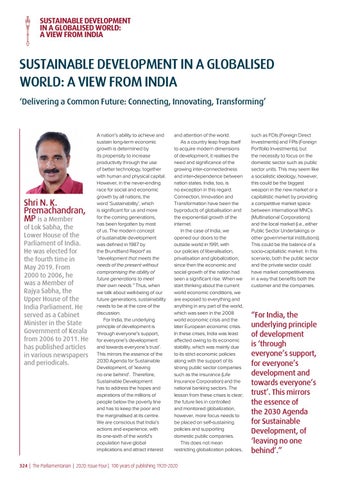SUSTAINABLE DEVELOPMENT IN A GLOBALISED WORLD: A VIEW FROM INDIA
SUSTAINABLE DEVELOPMENT IN A GLOBALISED WORLD: A VIEW FROM INDIA ‘Delivering a Common Future: Connecting, Innovating, Transforming’
Shri N. K. Premachandran, MP is a Member
of Lok Sabha, the Lower House of the Parliament of India. He was elected for the fourth time in May 2019. From 2000 to 2006, he was a Member of Rajya Sabha, the Upper House of the India Parliament. He served as a Cabinet Minister in the State Government of Kerala from 2006 to 2011. He has published articles in various newspapers and periodicals.
A nation’s ability to achieve and sustain long-term economic growth is determined by its propensity to increase productivity through the use of better technology, together with human and physical capital. However, in the never-ending race for social and economic growth by all nations, the word ‘Sustainability’, which is significant for us and more for the coming generations, has been forgotten by most of us. The modern concept of sustainable development was defined in 1987 by the Brundtland Report1 as “development that meets the needs of the present without compromising the ability of future generations to meet their own needs.” Thus, when we talk about well-being of our future generations, sustainability needs to be at the core of the discussion. For India, the underlying principle of development is ‘through everyone’s support, for everyone’s development and towards everyone’s trust’. This mirrors the essence of the 2030 Agenda for Sustainable Development, of ‘leaving no one behind’. Therefore, Sustainable Development has to address the hopes and aspirations of the millions of people below the poverty line and has to keep the poor and the marginalised at its centre. We are conscious that India’s actions and experience, with its one-sixth of the world’s population have global implications and attract interest
and attention of the world. As a country leap frogs itself to acquire modern dimensions of development, it realises the need and significance of the growing inter-connectedness and inter-dependence between nation states. India, too, is no exception in this regard. Connection, Innovation and Transformation have been the byproducts of globalisation and the exponential growth of the internet. In the case of India, we opened our doors to the outside world in 1991, with our policies of liberalisation, privatisation and globalization; since then the economic and social growth of the nation had seen a significant rise. When we start thinking about the current world economic conditions, we are exposed to everything and anything in any part of the world, which was seen in the 2008 world economic crisis and the later European economic crisis. In these crises, India was least affected owing to its economic stability, which was mainly due to its strict economic policies along with the support of its strong public sector companies such as the insurance (Life Insurance Corporation) and the national banking sectors. The lesson from these crises is clear; the future lies in controlled and monitored globalization, however, more focus needs to be placed on self-sustaining policies and supporting domestic public companies. This does not mean restricting globalization policies,
324 | The Parliamentarian | 2020: Issue Four | 100 years of publishing 1920-2020
such as FDIs (Foreign Direct Investments) and FPIs (Foreign Portfolio Investments), but the necessity to focus on the domestic sector such as public sector units. This may seem like a socialistic ideology, however, this could be the biggest weapon in the new market or a capitalistic market by providing a competitive market space between international MNCs (Multinational Corporations) and the local market (i.e., either Public Sector Undertakings or other governmental institutions). This could be the balance of a socio-capitalistic market. In this scenario, both the public sector and the private sector could have market competitiveness in a way that benefits both the customer and the companies.
“For India, the underlying principle of development is ‘through everyone’s support, for everyone’s development and towards everyone’s trust’. This mirrors the essence of the 2030 Agenda for Sustainable Development, of ‘leaving no one behind’.”
